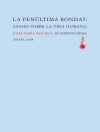Humanism in business is not only an alternative to economism but a way to human excellence. Humanism presented here revolves around the rich notion of “human person”, keystone of modern personalist philosophy and Catholic Social Teaching. From this perspective this book is offered to everyone, believer and nonbeliever alike.
The person-centered humanism considers the human-wholeness, individual and relational, with subjectivity, self-determination, openness to transcendence, and with capacity not only to possess but also to give. It also highlights the uniqueness of each person, endowed with a high constitutive dignity and in continuous process of flourishing toward human plenitude. An attitude of respect and good will is due to non-personal beings, while persons deserve to be treated with justice and even with love of benevolence.
The book is prepared in dialogue with mainstream of thought in business and business ethics and focused on exploring ways to improve some conventional views. It includes some proposals such as a person-based ethics, ethics understood as intrinsic to business activity, the consideration of the company as an organized community of persons, and the purpose of the company oriented toward the common good through a double mission, internal and external. It is also suggested substituting the notion of “stakeholder” for the richer one of “relationholder.”
İçerik tablosu
Part I. EXPLORING THE SOURCES OF THE CATHOLIC TRADITION.- Chapter 1. Catholic Theology on Economics and Business: A Long Tradition.- Chapter 2. The Anthropological Grounds of Economic Activity.- Chapter 3. A Person-Friendly Ethics.- Chapter 4. Freedom and Commitment to the Common Good.- Part II. ECONOMIC SYSTEM, BUSINESS AND SOCIETY.- Chapter 5. Ethics in the Free Market Economy.- Chapter 6. Identity and Purpose of the Business Firm.- Chapter 7. Responsibility and Sustainability.- Chapter 8. Economic Policymaking and Corporate Governance.- Part III. LEADING BUSINESS ORGANIZATIONS.- Chapter 9. Ethics in Decision-Making.- Chapter 10. The Centrality of Work in the Production Process.- Chapter 11. Service to Customers.- Chapter 12. The Christian Ethos in Leadership and Organizational Cultures.
Yazar hakkında
Domènec Melé is Emeritus Professor and former Chair of Business Ethics at IESE Business School, University of Navarra, Spain. He earned a doctorate in Industrial Engineering from the Polytechnic University of Catalonia, Spain (1975), and another Ph D degree in Theology from the University of Navarra (1983). Over the last 38 years, has taught and researched, publishing about 70 articles in referred journals and book sections on economic and business ethics, corporate social responsibility, humanistic management, Christian perspectives on business, and philosophy of management. Professor Melé has chaired the biennial International Symposium on Ethics, Business and Society led by IESE from 1991 to 2014 (18 editions). Now, he is associate editor of the Humanistic Management Journal and a member of several editorial boards. Previously he has served as section editor of the Journal of Business Ethics for ten years. He is author of Management Ethics (Palgrave, 2012), and Business Ethics in Action: Managing Human Excellence in Organizations, 2nd ed. (Red Globe Press, 2019). He also co-authored Human Foundations of Management. Understanding the ‘homo humanus’ (Palgrave, 2014). He has also co-edited five special issue of international Journals and three books: Human Development in Business. Values and Humanistic Management in the in the Encyclical «Caritas in Veritate» (Palgrave, 2012), Humanism in Economics and Business. Perspectives of the Catholic Social Tradition (Springer, 2015) and A Catholic Spirituality for Business. The Logic of Gift (The Catholic University of America Press, 2019).












